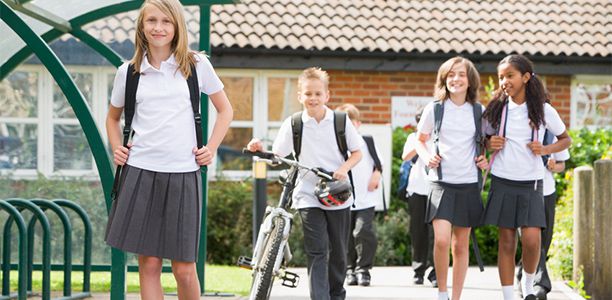Only one in seven Queensland children walk or cycle to school, and those who don’t are missing out on potential health benefits, including a significant boost to mental wellbeing – new research shows.
A Griffith University initiative is aiming to overcome barriers to walking and cycling to school for parents and their school-going children.
‘Let’s Go! is a new campaign designed by Social Marketing @ Griffith researchers to help parents and children put active travel to school higher on their priority list.
“Children who walk or bicycle to school are less stressed, perform better at school and have more positive emotional experiences than those who arrive by car, research has shown,” Professor Sharyn Rundle-Thiele said.
Barriers
However, Queensland survey data gathered by PhD candidate Bo Pang shows only 14% of Australian children walk or cycle to school. The study identified four main barriers preventing parents from letting their children walk to school.
“The most influential factor is social norms,” Professor Rundle-Thiele said. “If there are few parents from someone’s neighbourhood or social circle letting their children walk to school, then that person tends to make the same choice and not allow their children to walk or cycle either.”
The other main barriers focused on a perceived risk involving traffic or ‘danger strangers’, long distances to and from school, and perceived time constraints which made it all too hard.
Focus groups led by Bo Pang and Associate Professor Krzysztof Kubacki gathered as part of the larger Griffith Business School research study leading to Let’s Go delivered key insights for the program.
“We also found that parents who walk alongside their children benefit from enhanced mental wellbeing,” Bo Pang said. “Other benefits are physical wellbeing, opportunities for social interaction and enhanced sense of community.”
“One respondent told us that with walking, they get more time with the child and more social interaction,” Associate Professor Krzysztof Kubacki said.
“The campaign encourages parents to view walking to and from school as an opportunity for children to reflect and unwind.”
Another respondent highlighted the opportunity for children to transition on the walk home after school. “It’s almost like an opportunity to decompress as a kid, to go ‘well, that part of my day is finished and I’m transitioning now back to family time’.”
The Social Marketing @ Griffith team is now seeking Queensland primary schools to become partners in the ‘Let’s Go!’ program trial.
“These partnerships will help us design and fine-tune a social marketing campaign that makes active travel fun,” Professor Rundle-Thiele said.
“Increasing physical activity is one of two ways we can combat obesity in Australia and there is no cheaper means of physical activity than walking.
“The percentage of Australian adults who are obese has tripled and, as we know, health expenditure for obese people is higher.”
(Source: Griffith University)










